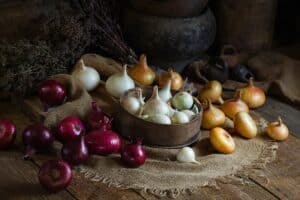As the saying goes; when life gives you lemons, make lemonade, though there are several recipes that call for lemon juice and lemon zest too.
Lemons only last for so long so you should look for those telltale signs when they go bad and make sure you use as much of them as possible.

Depending on how you store lemons, you can prolong their shelf life yet you need to use them up before they go bad as they can make an individual ill. Thankfully, those indicators are quite obvious but it helps to know what they are and how to avoid them.
In this guide, we will look at how long lemons last for and how to tell if they have gone bad. We will also detail how to store lemons properly and how to store lemon juice properly too.
How Long Do Lemons Last?
As long as you buy fresh lemons, they should last for a couple of weeks at room temperature when left on the counter top or in the pantry. You can double that time period if you keep them in the refrigerator, like you can with many foodstuffs.
You can also freeze lemons and in the freezer they can last for between three and four months. By cutting into a lemon, you are reducing its shelf life to just a few hours at room temperature and only two to three days in the refrigerator.
Fresh lemon juice has a similar shelf life to cut lemons of just a few hours when left at room temperature so be careful with it.
The substance can also last for between two and three days when left in the refrigerator though you can freeze it in an ice cube tray which will keep for three to four months when left in the freezer.
For bottles of lemon juice, you can expect them to last a single hour when left out at room temperature so you are best off using it and then putting it back. That’s because, when kept in the refrigerator, bottles of lemon juice have a shelf life of between four and six months.
How To Tell When Lemons Have Gone Bad
The obvious sign that a lemon has gone bad is if you spot some blemishes on the outside. A good lemon will be a bright lemon color and have a uniform skin that should feel firm.
With a fresh lemon, the rind should be relatively smooth and shiny which is ideal for grating. Those brown spots are the first sign that a lemon has gone bad and white mold is a further one to look out for.
Should your lemon be oozing then it has surely gone bad so check that it is dry on the outside and has not leaked. Give that lemon a squeeze too as a mushy lemon is on the way to going bad as is if it appears shriveled too.
Lemons should have a weight to them and a firmness so if they feel like a ripe avocado when you squeeze them then that texture will indicate that they are probably already on the turn.
The smell is also important as you should not be able to smell much at all with a fresh lemon. Should you smell any mold or an aroma that smells like fermentation then this is another indicator that the lemon has gone bad.
That smell can extend to the inside too as a vinegary smell is another surefire sign of a bad lemon that you should be throwing away.

How To Store Lemons Properly
Storing lemons properly should mean you can use them in recipes and get the best, freshest taste out of them. You can simply store uncut, whole lemons on the kitchen countertop and they can last a full week.
Be sure to store these fresh lemons away from other fruits as, in particular, apples and bananas release ethylene gas when they ripen. Exposure to this gas can speed up the natural ripening of lemons which can then lead to brown, soft spots.
If you prefer to store your lemons in the refrigerator then keep them away from other fruits or you could leave them in an airtight container.
The crisper drawer should be an ideal place to keep them though Ziploc freezer bags are also handy, just make sure you push out most of the air in the sealed bag. You could keep your lemons for as long as six weeks using this method.
Should you want to use some of the lemon as slices or for juice then you can save the remaining slices and halves. These can be stored in an airtight container or another Ziploc freezer bag to be kept for a further five to seven days.
To keep a lot of their juice, wrap slices or wedges of lemon in food wrap, plastic wrap, or aluminum foil to prevent them from drying out while you freeze them.
How To Store Lemon Juice Properly
Lemon juice can be just as easily stored and you can extend its shelf life too. Squeeze out the juice into an airtight container like a mason jar with a tight-fitting lid.
You can keep the container in the refrigerator for up to four days. Should you keep the juice there for any longer, you can expect it to lose its flavor and potent taste.
Final Thoughts
Lemons can feature in so many recipes that you should be keen to use them as quickly as possible. That should mean inside a week when kept on the countertop or perhaps a few days more when you keep them in the pantry.
Remember, you can extend the shelf life of lemons by keeping them in the refrigerator though if you decide to use the freezer, there is some key preparation. Keep some airtight containers, Ziploc freezer bags, and even an empty ice cube tray handy.
Frequently Asked Questions
You can easily freeze whole lemons by placing them in a Ziploc freezer bag and they can stay in the freezer for up to four months.
Once you are ready to use them, let them defrost at room temperature though they will have a softer texture. That softness can make them difficult to grate so you may want to stick to using the juice.
You can also freeze lemon slices by chopping up a lemon accordingly, removing the seeds, and spreading out the slices onto a piece of parchment paper to flash freeze for an hour on a baking sheet.
Should you only need lemons for their zest then you should insist on grating them as soon as you can.
The peel and rind will lose its moisture pretty quickly with its flavor. With the zest removed, you can store the lemons in a Ziploc freezer bag and keep them in the refrigerator for up to a week.







